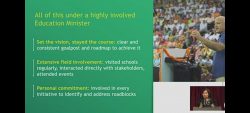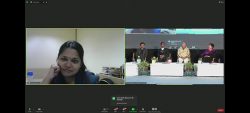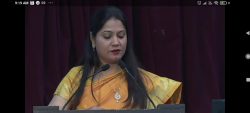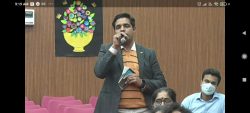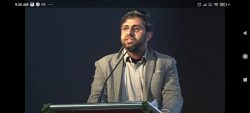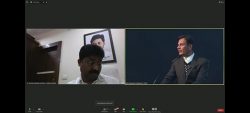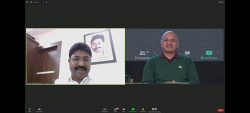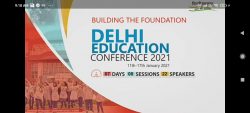
DELHI EDUCATION CONFERENCE
DAY 1: REPORT LAUNCH BY BOSTON CONSULTING GROUP ON DELHI EDUCATION REFORMS
The seven-day Delhi Education Conference began on Monday with an independent report on the Delhi government’s education reforms since 2015 being released by the Boston Consulting Group.
Panelists: Manish Sisodia, Atishi, Shailendra Sharma, H. Rajesh Prasad, Udit Prakash Rai, Saumya Gupta, Padmini Singla
An independent study of the Delhi education reforms between 2015 and 2020 was conducted by Boston Consulting Group (BCG). It has captured in great detail the processes, structures, and initiatives that have led to the evolution of the Delhi Education Model.
It pointed out that the true impact of Delhi’s reforms has been vitalising the entire system and infusing a sense of renewed aspiration, belief, and deep motivation into every stakeholder.
Key Architects of the Delhi education reforms will be engaged in a panel discussion reflecting on the previous reforms, the journey so far, and setting the context for the new age of education reforms.
Discussing the key aspects and challenges to building a high-performing education system, which is also effective and equitable?
Moreover, the report highlighted Delhi government’s seven key initiatives like Chunauti and Mission Buniyaad that empowered the students on a grassroots level by involving teachers and parents alike.
DAY 2: GETTING CHILDREN READY FOR FORMAL LEARNING
Panelists: Venita Kaul, Sebastian Suggate, Tuuli Mäkinen, Divya Jalan
This panel will aim to define the foundations of formal learning, what children should learn before they begin to learn in school, and how policymakers and educators in India should build these right foundations and what their immediate and long term priorities should be.
The Delhi Government’s International Education Conference 2021 kicked off its day two with a panel discussion on ‘Get Children Ready for Formal Learning’ led by policy experts from Finland, Germany and India. “In the context of New Education Policy (NEP) 2020, the Delhi Government should work on setting up a cadre of specially trained foundational stage teachers and make them the most important part of the school system,” said Venita Kaul, professor and director of School of Education Studies and founder-director of Center for Early Childhood Education and Development (CECED), Ambedkar University at the session.
This invigorating panel had revered education experts like Dr Divya Jalan, founder member of Action for Ability Development and Inclusion (AADI), Sebastian Suggate (Germany), senior lecturer in education at the University of Regensburg, Tuuli Makinen (Finland), a preschool educator, and Kaul. The session was moderated by Mythili Bector, teacher-former principal and present in-charge of Primary and Library branch of Directorate of Education, Govt. of Delhi. The session opened with introductory remarks by Lucy Crehan (UK), author of ‘Cleverlands’ and an international education consultant.
The panel with its focus on early childhood education and formal education ran through four key discussions – school starting age, pre-academic and social skills, addressing early learning gaps, and implementing NEP’s recommendation of ensuring foundations and school readiness.
On the appropriate age to begin formal education for children, Makinen, who is a preschool educator in Finland said, “We’ve noticed that in Finland, at age 7, the majority of children are ready and feeling motivated. They are interested in reading and learning. Since they’ve already been given the essential socio-emotional skills in preschool, we feel that that’s the right age and have had that for the past 50 years.”
Makinen also talked about prioritising teacher training, and emphasised the need for teachers to be prepared with all aspects of child behaviour in their classrooms. “In Finland, teachers observe the child. How h/she reads & learns. Setting individual goals is important for early formative education. We follow positive education by focusing on the child’s strength and character more.”
On addressing the learning gaps, especially in education for special needs children, Jalan said that in India, lack of information for caregivers and parents has been the biggest hurdle. “They need acceptance, and a lot of support. But things are changing as they’re demanding inclusive schools and services,” she said.
“It is important to understand the gaps in education and experiences in the life of a special needs child. Experiences shape their understanding, and therefore, teaching techniques need to be more varied and creative to enhance learning,” Jalan said. She added, “Teachers should work on how they can include the child in classrooms. School readiness in terms of infrastructure resources, and sensitising all children and parents is equally important in India.”
Suggate, who’s a researcher in child development, and has conducted research into reading and school starting age discussed how first-generation learners can benefit from early childhood education. He said, “Traditionally, in India, families often sing to their children and read stories to them. Such traditional family structures and experiences are intrinsically motivating for children in their foundational stage.”
Additionally, Suggate added that in early childhood education, sensory motor foundational skills, and academic learning is linked. He said, “You can take something like fine motor skills of children and link it later to mathematics, speaking and movement.”
Kaul, professor and former head of Department of Preschool and Elementary Education, NCERT also highlighted the importance of having a comprehensive curriculum for students aged 3 to 8. “In the light of NEP which talks about seamless transition into primary education, there needs to be a comprehensive curriculum for ages 3 to 8. It’ll come handy to teachers, and serve as a guiding framework to work with. Unless they’re extremely well-trained, they won’t be able to think for themselves.”
Kaul also talked about the role of anganwadi workers’ future. She said, “The focus should be on blended training for Anganwadi workers. Their workload needs to be reassessed too since their role is not just limited to teaching.”
While concluding the panel discussion, the panel offered their advice to the education minister Manish Sisodia — to develop strong teacher-training programmes, appreciate teachers, and focus on children having primary experiences with their environment, especially in this digital age.
REPORT ON DELHI EDUCATION CONFERENCE 2021
TREAT TEACHERS AS PROFESSIONALS
On Day 3 of education conference, experts suggest ways to improve teaching
On the third day of the week-long Delhi education conference, organised by the Delhi government, policy experts from the United Kingdom, Netherlands, and also from India led a panel discussion focusing on improving professional development for teachers
On the third day of the week-long Delhi education conference, organised by the Delhi government, policy experts from the United Kingdom, Netherlands, and also from India led a panel discussion focusing on improving professional development for teachers.
The panel included education experts Jelmer Evers, learning expert from the Netherlands, Subramanian Giridhar, COO of Azim Premji University, Harry Fletcher-Wood, associate dean at Ambition Institute and an expert in teacher development, and Lucy Crehan, an international education consultant.
Giridhar suggested the setting up a voluntary teacher forum wherein teachers could discuss their work. “A forum where groups of 20-25 teachers take up a topic and come together periodically with a simple focus on ‘Can I teach better tomorrow?’ Administrators should also periodically engage with the local community. They should then identify subject specialists and high performing teachers and welcome them into the system,” he said.Crehan, who has studied the education model of five countries, said, “In Japan, China, Singapore, the practice of ‘lesson study’ is common.
The teachers come together and produce lesson plans on how to teach a certain concept.” Fletcher, a history teacher in England, said teachers must spend time together “to work on their ideas outside of classrooms to refine their teaching plans.”
Deputy chief minister Manish Sisodia, who holds the education portfolio, said, “Ideas like focusing on quality teacher training, developing good infrastructure and offering a conducive work environment for teachers are important for our government. If we work together, we can implement all these ideas.”
PANEL SESSION 3: SUPPORT CHILDREN TO TAKE ON CHALLENGES RATHER THAN MAKING CONCESSIONS
Current education systems, particularly in India, struggle with an “either-or” situation – mastery for some OR minimum learning for all. The objective of this session is to understand how to transform this to a high quality effective learning for all?
Panelists: Yeap Ban Har, Jeremy Hodgen, Pranav Kothari, Lant Pritchett, Amit Kaushik
Allow children to ask questions, through the process of questioning, challenge & revision, they may in time come say smarter things”.Hear Yeap Ban Har on ways to motivate children to take challenges & become efficient learners.
It Will be moderating discussion on how we can support children to take on challenges rather than make concessions and how we reconcile “either-or” situation – mastery for some OR minimum learning for all & transition into quality effective learning for all. On a concluding note, the Moderator asks the panelists again, about the one word that they will give for how they see curriculum.
PANEL SESSION 4: DESIGNING CURRICULAM CONCEPTS FOR MASTERY AND CONTEXT FOR MOTIVATION
Session Objective: This session aims to deliberate on how curricula should be designed so as to best support students to develop the knowledge and skills required for self- growth and participation in society, and access to future opportunities. How best to do this in a context where within each grade there is a wide range of learning levels among children.
Panelists: Berinderjeet Kaur, Tim Oates, Rukmini Banerji, Subir Shukla
This session explores the implications of those principles for the intentional and systemic design of four key elements of the educational system—curriculum, instruction, assessment, and professional development—to promote learning with understanding within the context of advanced study. It is critical to recognize that programs for advanced study share many of the objectives of other programs in the same discipline; these design principles, therefore, also apply to the design and development of mathematics and science courses at all levels.
While each of the four key elements is addressed separately here, in practice they work together synergistically and need to be aligned in mutually supportive ways. Without such alignment and interdependence, deep conceptual understanding is more difficult to achieve. For example, if teachers focus on teaching “big ideas” but the related assessments measure students’ knowledge of discrete facts, it is impossible to know the extent to which students genuinely understand core concepts. The systemic and dynamic relationship among the four elements also means that changes in one element affect and require changes in the others.
In addition, it is essential to recognize the critical role of the learning environment in fostering learning with understanding. The learning environment of the school and the classroom in which these components of educational programs interact affects the degree to which teachers can integrate curriculum, instruction, and assessment to promote learning with understanding
REPORT
DAY 6TH DELHI EDUCATION CONFERENCE, 2021
Conference title- Combine school accountability with school support
Conference Resource person– Seema Roy Chaudhury, Principal school of excellence Delhi.
Date & time- 16 Jan,2021;1700 TO 1900hrs
Panelists– Deirdre Kinsella Biss (Canada), Lee Crawfurd (England), Yamini Aiyar (India) and Aditya Natraj (India).
Objective– The aim of this session is to suggest how schools in Delhi or India cannot just be held accountable, but also support to improve. The panel targeted at teachers to enable schools to improve their performance.
Conference structure– In today’s session we learnt that what is the role of accountability, in what extent it is to be changed, what is needed for restructuring of education system in schools of Delhi.
The panelists have discussed about norms/process of school.
The important point that has been suggested by Mr. Aditya Natraj- Unless we change the micro-norms like sitting order of staff, we cannot change the feudalistic patriarchal architecture in India. Then Yamini Aiyar emphasized on ‘Restructuring the grammar of the education ecosystem.’
Conclusion– Use of accountability in different subjects with school support that helps in creating positive classroom environment that makes the change in schools of India.
DAY 7: RECAPITULATION OF PREVIOUS DAYS
Summarizing and reflecting on the discussions from the conference.
They began the conference by reflecting on Delhi’s experience of implementing education reforms over the past five years which has brought an education revolution in Delhi schools. Then, they captured insights from successful education systems around the world on the lines of Lucy Crehan’s much talked about book Clever lands and explored different themes like foundational learning, curriculum, and school accountability among others.
Delhi government held a seven-day international education conference from January 11 to brainstorm on how schooling and learning should be when schools reopen after Covid-19.
The conference, the website for which was launched on Wednesday by education minister Manish Sisodia, will have 22 education experts from different parts of the world.
The conference will reflect on Delhi’s education reforms, learn from global best practices and explore the possibilities of collaboration with other stakeholders as a way forward. It will begin with the release of an independent study conducted by Boston Consulting Group on the process and achievements of Delhi’s education reforms over the past five years.
As we come to a close, we will deliberate on our learnings from the last six days and chart a roadmap for future education reforms. The discussion will feature political leaders, policy makers, and researchers from India and abroad.


